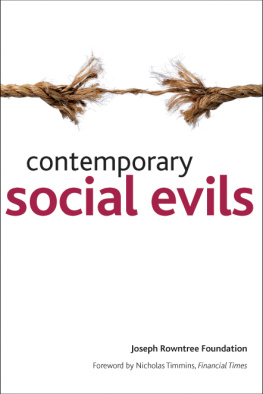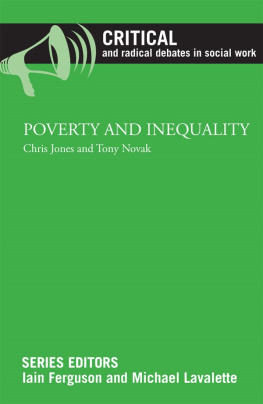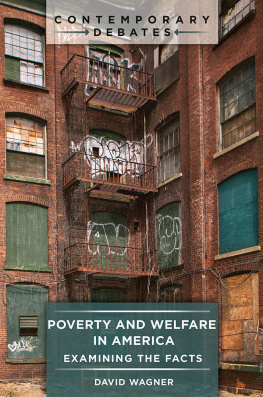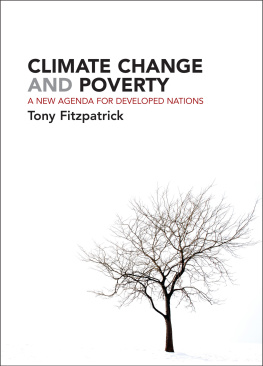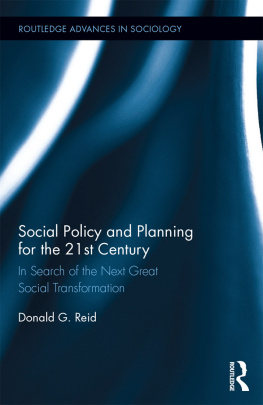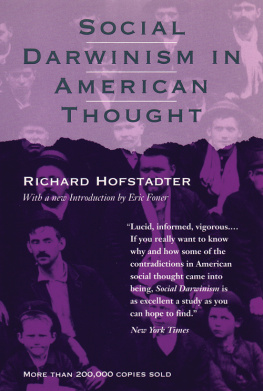This edition published in Great Britain in 2009 by The Policy Press for the
Joseph Rowntree Foundation
The Policy Press
University of Bristol
Fourth Floor, Beacon House
Queens Road
Bristol BS8 1QU, UK
t: +44 (0)117 331 4054
f: +44 (0)117 331 4093
e: tpp-info@bristol.ac.uk
www.policypress.org.uk
North American office:
The Policy Press, c/o The University of Chicago Press
1427 East 60th Street Chicago, IL 60637, USA
t: +1 773 702 7700 f: +1 773-702-9756
e: sales@press.uchicago.edu www.press.uchicago.edu
Joseph Rowntree Foundation 2009, except:
Chapter 2 Jose Harris
Chapters 4 and 5 National Centre for Social Research
Chapter 7 Anthony Browne
Chapter 8 A.C. Grayling
Chapter 9 Julia Neuberger
Chapter 10 Shaun Bailey
Chapter 11 Anna Minton
Chapter 12 Zygmunt Bauman
Chapter 13 Neal Lawson
Chapter 14 Stephen Thake
Chapter 15 Chris Creegan
Chapter 16 Ferdinand Mount
Chapter 17 Jeremy Seabrook
Chapter 18 Royal Society for the encouragement of Arts, Manufactures and
Commerce (RSA)
British Library Cataloguing in Publication Data: A catalogue record for this book is available from the British Library.
Library of Congress Cataloging-in-Publication Data: A catalog record for this book has been requested.
ISBN 978 1 84742 408 2 paperback
ISBN 978 1 84742 409 9 hardcover
All rights reserved: no part of this publication may be reproduced, stored in a retrieval system, or transmitted in any form or by any means, electronic, mechanical, photocopying, recording or otherwise without the prior permission of The Policy Press.
The statements and opinions contained within this publication are solely those of the editor and contributors and not of the Joseph Rowntree Foundation, the University of Bristol or The Policy Press. The Joseph Rowntree Foundation, the Universit y of Bristol and The Policy Press disclaim responsibility for any injury to persons or property resulting from any material published in this publication.
The Policy Press works to counter discrimination on grounds of gender, race, disability, age and sexuality.
Cover design by The Policy Press
Front cover: image kindly supplied by www.istock.com
Printed and bound in Great Britain by Hobbs the Printers, Southampton
Foreword
Nicholas Timmins
History is littered with exhortations from the great and the good to the aspiring to go out and solve problems.
Forty years before he wrote the report that bears his name, William Beveridge was urged by Edward Caird, the Master of Balliol, to go forth and discover why, with so much wealth in Britain, there continues to be so much poverty, and how poverty can be cured (Beveridge, 1953, p 9).
The Joseph Rowntree, in setting up the trusts that bear his name, charged them with an even broader remit: to seek out the underlying causes of weakness in society. And it is that duty that has led JRF to re-examine, perhaps redefine, the social evils that need to be tackled a hundred years on.
This book, the results of thousands of contributions from normally unheard voices to those of some of the countrys most distinguished social commentators, is the outcome and it is challenging, stimulating reading.
For a country in which religious observation is now a minority sport, the use of the word evil packs a powerful, even disturbing, punch. But from the online consultation and some of the contributions to this book, concerns about the decline of community and family (or at the least, its rapidly changing nature), and worries about rampant individualism, consumerism and a loss of solidarity emerge strongly.
One needs a degree of caution in analysing this.
Opinion polling regularly reveals a sense of pessimism about the present in the British character. Whether one is thinking of society as a whole, or the state of public services for example, Britons tend instinctively to believe in a better yesterday, even in the face of the facts and even if (depending on economic circumstances) they may still believe that a better tomorrow is possible, or even likely. After all, it was in the 1950s now seen by some as an ideal time of social cohesion, if by others as a period of social repression when the composer and lyricist Lionel Bart struck a powerful chord, although admittedly a humorous one, with Fings aint what they used to be.
But while this project was conceived in better economic times, now may be the ideal time to publish it. Recession will, for the time being at least, reduce both the public and private resources needed to tackle many of the concerns outlined here. But there is nothing like a crisis to trigger a rethink, both individually and collectively, about societys values, goals and directions.
There is not unsurprisingly entire agreement within this book about how modern social evils should be tackled, but there is a fair element of agreement over how to define them.
History suggests that major reform tends to follow major disruption whether great wars or the Great Depression, with modern welfare states and institutions emerging from the ashes such events create. How bad the current recession will be, nobody yet knows. But it may be that now is the perfect moment, having started the debate, for the JRF to encapsulate it in this book and take the argument onwards. Difficult times may, paradoxically, provide the best moment for framing difficult solutions.
Acknowledgements
The Joseph Rowntree Foundation (JRF) first would like to thank all the people who took part in the public consultation, without whom there would have been no project. This includes the participants in the unheard voices research and the 3,500 website respondents who gave up precious time to provide us with their detailed and often heartfelt thoughts.
We are also indebted to numerous other individuals who have contributed to the project as it has developed: the Hartrigg Oaks residents who responded so enthusiastically to the initial idea; the participants in the three events we held to discuss the initial findings from the consultation; the staff and fellows of the Royal Society for the encouragement of Arts, Manufactures and Commerce (RSA), who have been so supportive over the course of the whole project; and Beth Watts and Chris Creegan who, although employed to undertake work on the project, became closely involved in its development over and above the call of duty.

